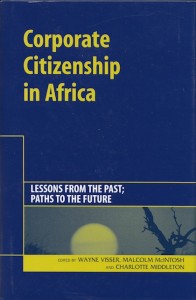Corporate Citizenship in Africa:
Lessons from the Past; Paths to the Future
Chapter by Wayne Visser
Extract from Corporate Citizenship in Africa
2005 saw a renewed interest in development and Africa, both regionally and internationally, most notably with the publication of Our Common Interest, the Commission for Africa’s Report chaired by the British Prime Minister with representatives from across Africa. This led to Africa being a specific focus at that summer’s G8 Summit at Gleneagles in Scotland, and, amongst other initiatives, the USA agreeing to reform, to some extent, its aid budgets to poor countries. This was, of course, prior to hurricanes Rita and Katrina that later in the year hit the Southern States of the US: exposing significant levels of poverty and neglect within the world’s richest country. The G8 meeting was preceded by Live8 which was seen globally by some three billion people, making it the world’s single largest event. Prior to this concert thirty million people signed a petition to the G8 leaders. As this book goes to press discussions are taking place on reform of the United Nations, one of the issues being how Africa could be better represented on the Security Council and other UN bodies.
Despite this progress, much of the literature on Africa remains problem-focussed, seeing Africa either as a moral dilemma for the rest of the world or as a waste of good aid money poured down the drain. This attitude is propped up by a plethora of statistics that show how Africa remains a marginal region in global terms: With 12% of the world’s population (around 750 million people) in 53 countries, Africa accounts for less than 2% of global gross domestic product (GDP) and FDI, and less than 10% of FDI to all developing countries. Of the 81 poorest countries prioritised by the International Development Association, almost half are in Africa. And even within Africa, there is highly skewed development, with the largest ten economies accounting for 75% of the continent’s GDP.

But there is also a growing desire to develop a better understanding of the world’s second largest continent and to celebrate the life of its people, literature, poetry, music, sport and social structures. And despite generally negative press, there has been significant progress on the continent over the past decade. Fifteen countries, including Uganda, Ethiopia and Burkina Faso, have been growing on average more than 5% per year since the mid-1990s. And foreign direct investment (FDI) rose to $8.5 billion in 2004, up from $7.8 billion the previous year. At the same time, Africa’s new generation of leaders, through initiatives like the New Partnership for Africa’s Development (NEPAD), the African Union and the East African Community, are taking responsibility for development.
Higher quantities and quality scholarly research is obviously needed, but so too is changing media perceptions outside Africa so that its richness is reflected on television screens around the world. Our Common Interest pointed out that Africa is different, that Africa’s development must follow a different path because of its history. For instance a snapshot of Africa in 2005 tells us that …
Continue reading
[button size=”small” color=”blue” style=”download” new_window=”false” link=”http://www.waynevisser.com/wp-content/uploads/2012/04/chapter_wvisser_intro_cc_africa.pdf”]Pdf[/button] Corporate Citizenship in Africa (chapter)
Related pages
[button size=”small” color=”blue” style=”info” new_window=”false” link=”http://www.waynevisser.com/books/corporate-citizenship-in-africa”]Page[/button] Corporate Citizenship in Africa (book)
Cite this chapter
Visser, W. (2006) Corporate Citizenship in Africa: Lessons from the Past; Paths to the Future, In W. Visser, M. McIntosh & C. Middleton (eds.), Corporate Citizenship in Africa: Lessons from the Past; Paths to the Future, Sheffield: Greenleaf, 10-17.


